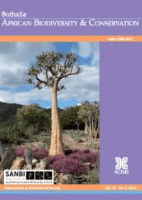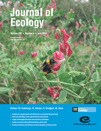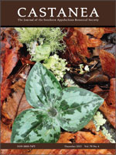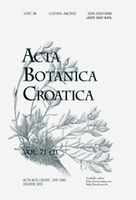
GAYANA BOTANICA
Scope & Guideline
Exploring the intricate world of ecology and horticulture.
Introduction
Aims and Scopes
- Biodiversity and Taxonomy:
The journal emphasizes the documentation and classification of plant species, particularly native and endemic species from regions like Chile and surrounding areas. This includes taxonomic revisions, new species descriptions, and floristic studies. - Ecological Studies:
Research related to plant ecology, including interactions within ecosystems, the effects of environmental changes, and the role of plants in their habitats, is a core focus. This encompasses studies on plant competition, community dynamics, and ecological restoration. - Conservation and Management:
GAYANA BOTANICA highlights research aimed at the conservation of plant species and ecosystems, addressing threats such as invasive species, habitat loss, and climate change. This includes studies that propose conservation strategies and assess the ecological health of ecosystems. - Ethnobotany and Utilization:
The journal also includes research on the traditional uses of plants, their economic potential, and the implications of such usage on conservation and sustainability. - Environmental Monitoring:
Research that incorporates the use of plants as bioindicators for monitoring environmental changes and assessing ecosystem health is also a significant area of interest.
Trending and Emerging
- Climate Change Impacts on Flora:
There is an increasing focus on how climate change affects plant morphology, distribution, and ecology. This theme is essential for understanding future biodiversity scenarios and developing adaptive management strategies. - Urban Ecology and Green Spaces:
Research on urban forestry and the composition of urban plant communities is gaining traction, highlighting the importance of green spaces in urban environments and their contributions to biodiversity and ecosystem services. - Genetic and Karyotypic Studies:
Emerging studies focusing on the genetic diversity and karyotypic characteristics of plant species reflect a growing interest in understanding the genetic basis of adaptation and conservation strategies. - Restoration Ecology:
Research aimed at ecological restoration and the rehabilitation of degraded ecosystems is increasingly prominent, illustrating a commitment to restoring biodiversity and ecosystem functions. - Plant-Environment Interactions:
There is a noticeable trend towards studying the interactions between plants and their abiotic environment, such as water availability, soil conditions, and UV radiation effects, which are critical for understanding plant resilience in changing climates.
Declining or Waning
- Invasive Species Research:
While previously a prominent theme, studies specifically focused on invasive plant species and their impacts have decreased. This could indicate a shift towards more localized conservation efforts or a broader ecological focus rather than invasive species management. - Fungal and Mycological Studies:
Research on fungi, particularly those associated with plant interactions and ecology, appears to be waning. This may suggest a move away from mycology in favor of more plant-centric studies, although fungal ecology remains an important aspect of ecosystem studies. - Lichenology:
Although lichen diversity was previously a recurring theme, recent publications suggest a reduced emphasis on this area. This decline may reflect a broader trend in botanical research where vascular plants are prioritized.
Similar Journals

BOTHALIA
Connecting researchers to the pulse of biodiversity.BOTHALIA is a prominent open-access journal dedicated to advancing the fields of Ecology, Evolution, Behavior, and Systematics, as well as Plant Science. Published by the South African National Biodiversity Institute (SANBI), this journal has been disseminating valuable research since 1978 and has embraced open access since 2014 to enhance the visibility and accessibility of scientific knowledge. With an ISSN of 0006-8241 and E-ISSN of 2311-9284, BOTHALIA plays a pivotal role in promoting biodiversity research in South Africa and beyond. In the recent Scopus rankings, it has been positioned at Q4 in both relevant categories, highlighting its contributions within the broader scientific community, despite being in its growing phase amidst competitive rankings. The journal aims to publish high-quality articles that address critical issues in biodiversity and ecological sciences, making it an essential resource for researchers, professionals, and students committed to understanding and managing our planet's biological heritage.

JOURNAL OF ECOLOGY
Exploring the intricate web of life and its processes.JOURNAL OF ECOLOGY, published by Wiley, stands as a leading publication in the field of ecology, evolution, behavior, and plant science, currently positioned in the prestigious Q1 quartile across these categories. Established in 1976, the journal has consistently provided a platform for innovative research and critical discourse related to ecological patterns, processes, and interactions. With its robust Scopus ranking—31st out of 721 in Ecology, Evolution, Behavior and Systematics, and 26th out of 516 in Plant Science—this journal notably reflects the high impact and influence of its articles in the scientific community. Although it does not offer open access options, the journal ensures comprehensive dissemination of pivotal findings to researchers, professionals, and students alike. Located in the United Kingdom at 111 River St, Hoboken, NJ, the JOURNAL OF ECOLOGY remains an essential resource for those dedicated to advancing our understanding of ecological systems and their complexities.

Mediterranean Botany
Bridging Science and Sustainability in Mediterranean BotanyMediterranean Botany is a distinguished peer-reviewed journal dedicated to the flourishing fields of Ecology, Plant Science, and Ecology, Evolution, Behavior and Systematics. Published by the Universidad Complutense de Madrid, Servicio Publicaciones, this Open Access journal has been disseminating valuable research since 2018, ensuring that findings are accessible to a global audience, with an emphasis on Mediterranean vegetation and biodiversity. With an ISSN of 2603-9109, it contributes significantly to the academic discourse in its category quartiles, recently featuring in Q3 for Ecology and related fields. Notably, Mediterranean Botany ranks within the top half of its category in Scopus, highlighting its relevance and contribution to the scientific community. Researchers, professionals, and students alike will find the journal to be a vital resource for latest discoveries, trends, and conservation strategies in Mediterranean ecosystems, positioning it as an essential platform for advancing knowledge and fostering collaboration within the plant sciences.

Boletin de la Sociedad Argentina de Botanica
Unveiling the complexities of plant evolution and interactions.Boletin de la Sociedad Argentina de Botanica is a prestigious open-access journal dedicated to advancing the field of botany, with a specific focus on plant science and ecological study. Published by the SOC ARGENTINA BOTANICA since 2005 and based in Argentina, this journal is committed to providing a platform for high-quality research that contributes to the understanding of plant biology, evolution, and ecological interactions. With an ISSN of 1851-2372, it features research articles that are accessible to a global audience, thus promoting collaboration and knowledge sharing among scientists, researchers, students, and the broader academic community. Despite being categorized in the fourth quartile for both Ecology, Evolution, Behavior and Systematics and Plant Science as of 2023, the journal serves as an important resource within its niche, offering insights from the Latin American context. Researchers and professionals are encouraged to utilize this journal as a valuable reference in their studies and contributions to the ongoing discourse in botanical science.

JOURNAL OF AQUATIC PLANT MANAGEMENT
Exploring sustainable solutions for aquatic plant challenges.JOURNAL OF AQUATIC PLANT MANAGEMENT is a key scholarly publication focusing on the management and ecological aspects of aquatic plant species. Published by the Aquatic Plant Management Society, Inc, this journal serves as an essential resource for researchers, practitioners, and policymakers involved in aquatic ecology, environmental science, and plant management. Although it does not offer open access, it remains influential in its peer-reviewed contributions to the field. Covering a broad spectrum of topics related to the management of aquatic plants, the journal has established its presence in significant academic databases and is well-regarded in areas such as Agricultural and Biological Sciences and Environmental Science. Despite facing challenges reflected in its Scopus rankings, which position it within the lower percentiles for various categories, the journal continues to strive towards enhancing our understanding of aquatic systems and the interplay of plant species therein. With its inception dating back to 1979, the journal underscores the long-term commitment to advancing knowledge in aquatic plant management.

NEW ZEALAND JOURNAL OF BOTANY
Illuminating the Intersection of Ecology and EvolutionThe New Zealand Journal of Botany, published by the esteemed Taylor & Francis Ltd, serves as a pivotal platform for disseminating significant research in the fields of Ecology, Evolution, Behavior and Systematics, as well as Plant Science. With a rich history dating back to 1963 and an impressive convergence extending to 2024, this journal has established itself as an essential resource for researchers and professionals dedicated to understanding the complexities of plant life and ecological systems in New Zealand and beyond. The journal is currently categorized in the Q3 quartile for both relevant disciplines as of 2023, reflecting its balanced influence within the global academic community. Although not an open access journal, it retains a significant impact factor, evidenced by its Scopus rankings, which place it within the top half of its categories. This makes it an invaluable tool for students, researchers, and academics aiming to engage with robust, peer-reviewed scientific findings and contribute to the evolving discourse surrounding botany and ecological research.

CASTANEA
Illuminating the Secrets of Southern Appalachian FloraCASTANEA is a distinguished journal published by the SOUTHERN APPALACHIAN BOTANICAL SOCIETY in affiliation with NEWBERRY COLLEGE. With an ISSN of 0008-7475 and an E-ISSN of 1938-4386, this esteemed publication serves as a vital platform for researchers and practitioners in the field of Plant Science. It has been circulating since 1982, and its scope focuses on the study of trees, their ecology, and conservation, thereby contributing significant insights into the biodiversity of the Southern Appalachian region and beyond. Despite its current ranking in the Q4 quartile and the 5th percentile in the Scopus Agricultural and Biological Sciences category, CASTANEA is committed to advancing knowledge and fostering a deeper understanding of plant sciences among academics and students alike. The journal does not currently offer Open Access options, maintaining a traditional subscription model that allows for carefully curated and peer-reviewed content. As you explore the advances in plant biology through CASTANEA, you will find an invaluable resource that supports both emerging and established scholars in their research endeavors.

Bulletin de la Societe Linneenne de Lyon
Fostering Dialogue in Natural SciencesBulletin de la Societe Linneenne de Lyon is a distinguished journal in the field of natural sciences, published by Société Linneenne de Lyon, a renowned institution in the heart of France. This journal, bearing the ISSN 2554-5280, serves as a crucial platform for the dissemination of high-quality research articles, reviews, and discussions that focus on the diversity of life and its conservation, reflecting the foundational principles established by Carl Linnaeus. Although it operates under a traditional access model, the bulletin significantly contributes to the advancement of botany, zoology, and ecology by providing a forum for original research that often garners attention from scholars and practitioners alike. With a commitment to fostering collaboration and dialogue among researchers, this journal is positioned as a vital resource for anyone dedicated to understanding the complexities of biological sciences and systems. The impact of its publications is amplified by its ties to a prominent academic community, making it an essential read for professionals, researchers, and students eager to stay informed on the latest developments in their fields.

ACTA BOTANICA CROATICA
Shaping the Future of Ecology and Evolutionary StudiesACTA BOTANICA CROATICA is an esteemed interdisciplinary journal dedicated to the exploration and advancement of botanical sciences, published by UNIV ZAGREB, FAC SCIENCE, DIV BIOLOGY. Since its inception, this journal has embraced an Open Access model, enabling researchers and the global scientific community easy and unrestricted access to cutting-edge findings in plant biology, ecology, and evolutionary studies since 2011. Covering a broad spectrum from plant science to ecological and evolutionary behavior, ACTA BOTANICA CROATICA holds an important position in the academic landscape, currently classified in the Q3 quartile for both Ecology, Evolution, Behavior and Systematics and Plant Science categories. With a robust ranking in Scopus, it stands at #246 out of 516 in Plant Science and #360 out of 721 in Ecology, showcasing its commitment to quality research dissemination. The journal invites contributions from researchers, professionals, and students aiming to broaden the horizons of botanical research and foster collaboration within the scientific community.

KEW BULLETIN
Unveiling Insights in Plant Science and Ecological ResearchKEW BULLETIN is an esteemed academic journal dedicated to the fields of plant science and ecology, published by SPRINGER LONDON LTD. With an ISSN of 0075-5974 and E-ISSN 1874-933X, it has been a significant resource for researchers and scholars since its inception in 1993, currently covering converged years up to 2024. The journal holds a notable position with a 2023 category quartile ranking of Q3 in Ecology, Evolution, Behavior and Systematics and Q2 in Plant Science, highlighting its contributions to advancing knowledge in these critical areas. Its Scopus ranks—#333 in Plant Science and #475 in Ecology, showcasing a percentile rank of 35th and 34th respectively—further authenticate its standing among peers. While KEW BULLETIN is not an open-access publication, it offers valuable research findings, insightful reviews, and fosters academic discourse, making it an essential platform for professionals, students, and researchers passionate about understanding the intricacies of plant life and ecological systems. Located at 236 Grays Inn Rd, 6th Floor, London WC1X 8HL, England, the journal remains committed to disseminating high-quality research and supporting the scientific community.